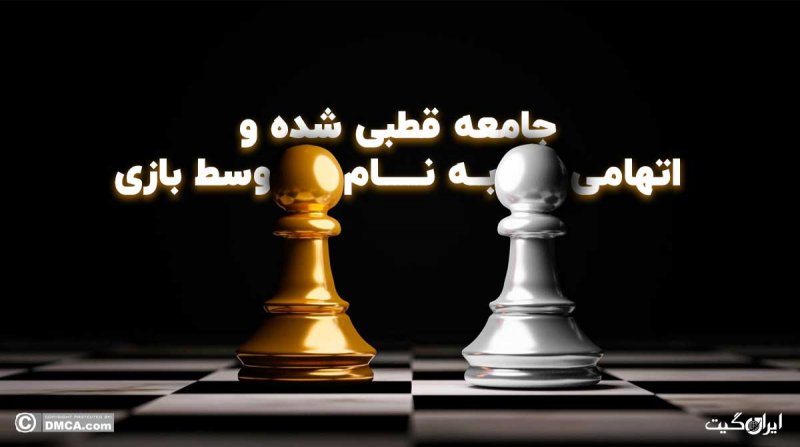A Polarized Society and an Accusation Called Fence-sitting
A study showed that the number of tweets published with the keyword ‘fence-sitter’ reached its highest level after the death of Mahsa Amini compared to the months before. They say that when a society becomes polarized, moderation has no place; you are either on one side of the story or the other, with no middle ground. If your behavior and speech are such that you don’t take a side, you are accused of fence-sitting.
Conservatives had borrowed the term ‘sedition dwellers’ years ago to describe this situation, although these days, the reformist movement and reformist figures are more often accused of fence-sitting, while simultaneously being one of the accused in recent protests by the radical revolutionary movement.
Fence-sitter as an Insult
The term ‘fence-sitter’ has always referred to those who, in any situation, choose the middle ground to avoid conflict. However, these days, it is used as an insult or derogatory term to intimidate a voiceless and scattered group, pushing them towards one of the two poles. Some believe that fence-sitting stems from false dichotomies created due to inaction and the inability to operate in the real world, manifesting in the virtual space.
This term is used without considering how much it corresponds to reality or how sufficient it is to describe the few remaining actors in the real space with its specific complexities. Others believe that those who turned fence-sitting into an insult never settled for any middle ground and always wanted everyone to be die-hard supporters, not just ordinary fans, the same ones who have managed teams instead of governing the country for years.
Fence-sitter in the Minority
While most people worldwide tend to favor conservatism, moderation, and standing in the middle, why has moderation become an insult in Iran? From this, it is concluded that radicals are not in the majority; they just have a loud voice. In the radicalized space, the two extremes have such powerful megaphones that the narrative of the majority in the middle is not heard, or the possibility of this voice forming does not exist.
If someone is critical of the government, they have no choice but to adopt the language and narrative of the radical faction; otherwise, they are condemned to be unseen and unheard, or boycotted. Conversely, if someone is considered conservative and opposes fundamental changes in society but does not accept the current structure’s performance, they are forced to align with the official narrative; otherwise, they too will be ostracized.
In the current situation, any moderate individual or force trying to reduce the anger of the people and the government and call for a rational space is met with opposition. Political scientist Elisabeth Noelle-Neumann uses the term ‘spiral of silence’ in this context, where people, fearing rejection and isolation by society, prefer to remain silent, leading to a state of intolerance that hinders achieving a democratic society.
A Narrow Playing Field
The polarized playing field is very narrow. For example, if someone criticizes foreign policy today, how can they express their critique without playing into the hands of a particular opposing foreign government or ignoring the flaws in diplomacy? This narrowing of the field causes the truth to be sacrificed. It’s not the critiques and arguments for or against a proposition or performance that matter, but the atmosphere surrounding your words that has become important, and your speech is judged based on that.
One of the reformist figures often accused of fence-sitting these days is Ahmad Zeidabadi. A Twitter user wrote to him, ‘Stop fence-sitting, Mr. Zeidabadi. Even if you say nothing, people won’t think you’re mute.’ He has a Telegram channel called ‘Different Perspective’ where he expresses his views, which have been heavily criticized lately, with some accusing him of not being different at all.
However, another user wrote in his defense, ‘When they hurl vulgar insults at Ahmad Zeidabadi with his background and at best call him a fence-sitter and a whitewasher, read the full story from this summary.’
Fence-sitter or Mediator
Some believe that overcoming the current crisis requires the presence of a mediating link between the people and the government, those who are now referred to as fence-sitters. These are figures who may not necessarily be recognized as reformists in terms of familiar political currents but have a reformist approach. This is in a situation where the complete removal of intermediary and moderate political forces from Iran’s political space in recent years has played a significant role in radicalizing the political space and the discourse of protesters.
Those who believe we should continue to explore ways to negotiate with the power institutions say we still need mediating forces. It is important for groups that are credible to power institutions and have social, scientific, and cultural authority, such as university professors, to take the initiative in dialogue with influential officials.
Reza Kianian wrote in one of his social media posts, ‘Being a fence-sitter is not an insult. ‘You are either with me or against me’ is the slogan of totalitarians, no matter who says it. Those on the streets or teenagers like Nika and Mahsa never called anyone a fence-sitter. This term is used by ultra-leftists or ultra-right extremists domestically.’
In line with this writing, the following articles are recommended:
- The Media War in London Benefiting Tehran’s Security Forces
- Turbans Tossing: Yes or No
DMCA Protected

